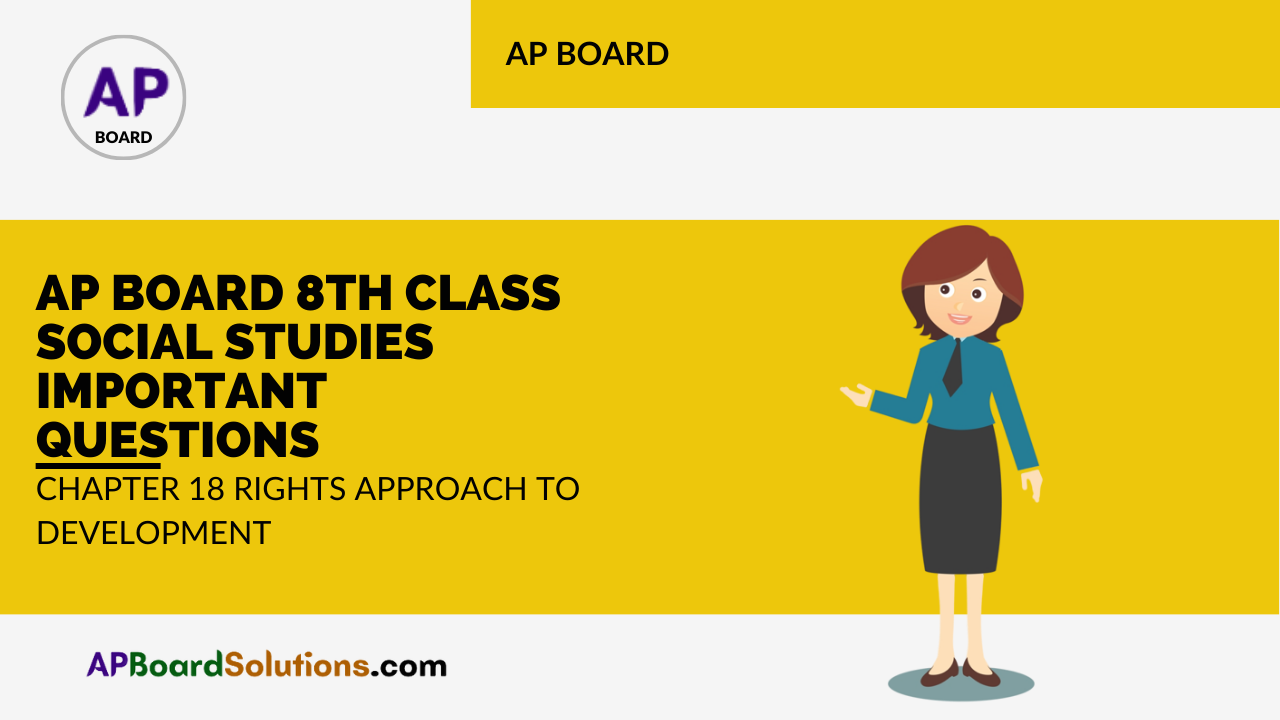These AP 8th Class Social Studies Important Questions 18th Lesson Rights Approach to Development will help students prepare well for the exams.
AP State Syllabus 8th Class Social 18th Lesson Important Questions and Answers Rights Approach to Development
Question 1.
What would give the poor people like Pavan and his mother a life with dignity?
Answer:
“Work hard – Lead the life”.
This only gives them a life with dignity.
Question 2.
Whose duty is it to ensure that Pa van and his mother are able to live a life of dignity and freedom?
Answer:
It is the duty of the society and the government to ensure that Pavan and his mother are able to live a life of dignity and freedom.
![]()
Question 3.
What are the arguments of people in “disclosing the information?”
Answer:
Their arguments are as follows.
- Information is crucial to the human development, and democratic rights. People can participate in government and ensure just development only if they have sufficient information in the form of official documents.
- Information will make governments more accountable in their functioning. It is possible to monitor the functioning and check possibility of corrupt practices. Information is crucial to the survival of the poor.
- In a situation where information has to be made public, arbitrary decisions by the elected representatives or the officials can be controlled.
Question 4.
How did the movement begin for disclosing information?
Answer:
A group of people in Rajasthan, organised themselves under the banner of Mazdoor Kisan Shakti Sangathan (MKSS) and demanded information. There was no legal provision to get the details of information as mentioned in the above paragraph from government to the people. Initially, these documents were collected with the help of officials. People evaluated these documents through public meetings. Soon officials began to resist the idea of disclosing the information. This led to a people’s movement.
![]()
Question 5.
Write about six main points of RTE.
Answer:
Right of Children to Free and Compulsory Education (RTE) Act, 2009
The RTE Act is meant for providing free and Compulsory Education to all Children in the age group of 6 – 14 years and came into force from 1st April 2010.
Important provisions of RTE Act
- Ensure availability of schools within the reach of the children.
- Improve School infrastructure facilities.
- Enroll children in the class appropriate to his / her age.
- Children have a right to receive special training in order to be at par with other children.
- Providing appropriate facilities for the education of children with special needs on par with other children.
- No child shall be liable to pay any kind of fee or charges or expenses which may prevent him or her from pursuing and completing the elementary education. No test for admitting the children in schools.
Question 6.
Comment this figure.

Answer:
There is an old lady in this picture. She belongs to a poor family. All the vessels are empty. We can see the rice in a vessel in a small quantity. The woman is also very weak due to lack of food. It is because of monsoon failure. She is a victim of famine.
![]()
Question 7.
Read the following passages and answer the given questions.
Answer:
Pavan is a boy of about 13 years, who lives with his mother. He lives in a temple town visited by a large number of pilgrims. Pavan stands outside the temple gate and begs the pilgrims for food by falling at their feet. Sometime, some of them give him stale left over food from their tiffin boxes. Sometimes, he carries heavy bags for them and is paid a small amount.
His mother works in a house as domestic help. She works almost for twelve hours everyday, through out the month. She is constantly ordered about by her employers including young children. She is given left over food after everyone else has eaten. She is not allowed to sit before the employers, and has to always talk to them meekly. She is often insulted for some minor errors or delays and has to fight back her tears and anger lest she be thrown out of job.
1) How old is Pavan?
Answer:
He is 13 years old.
2) Why do the people give Pavan some money?
Answer:
Sometimes he lifts heavy bags for them. So they give Pavan some small amount.
3) What does his mother do?
Answer:
She works in a house as domestic help.
4) Try to write any two of her problems.
Answer:
- She is not allowed to sit before the employers.
- She is often insulted for some minor errors.
5) Why does Pavan fall at their feet?
Answer:
To create pity and sympathy in the minds of pilgrims for money.
![]()
Question 8.
Read the following passage and answer the given questions.
JAN SUNVAYI: MKSS used to conduct meetings, called ‘jan sunvayi’ (or people’s hearings). It is true that many people cannot read the government documents themselves. But every person in a village would like to know what the documents say. Thus, these were read out and explained. A muster roll would give names of people for whom wages were paid for making a hand-pump. The villagers can identify if the people mentioned in the muster roll were present during those days or were migrants, or if they were paid the amount stated in the document. This would bring out the corrupt in practices. Through these events people brought in necessary action. Officials were also given opportunity to defend and talk about the details given in the documents. The district administration and panchayat officials also participated in these meetings. When corruption was identified, criminal cases were registered against the concerned persons.
1) What is the meaning of ‘Jan Sunvayi’?
Answer:
It means people’s hearings.
2) Why do they read out the documents?
Answer:
Many people cannot read the government documents, so they read out.
3) What is a muster roll?
Answer:
It is an attendance register.
4) What did they do through these events?
Answer:
Through these events they brought in necessary action.
5) When did they register criminal cases?
Answer:
When corruption was identified, they registered criminal cases.
![]()
